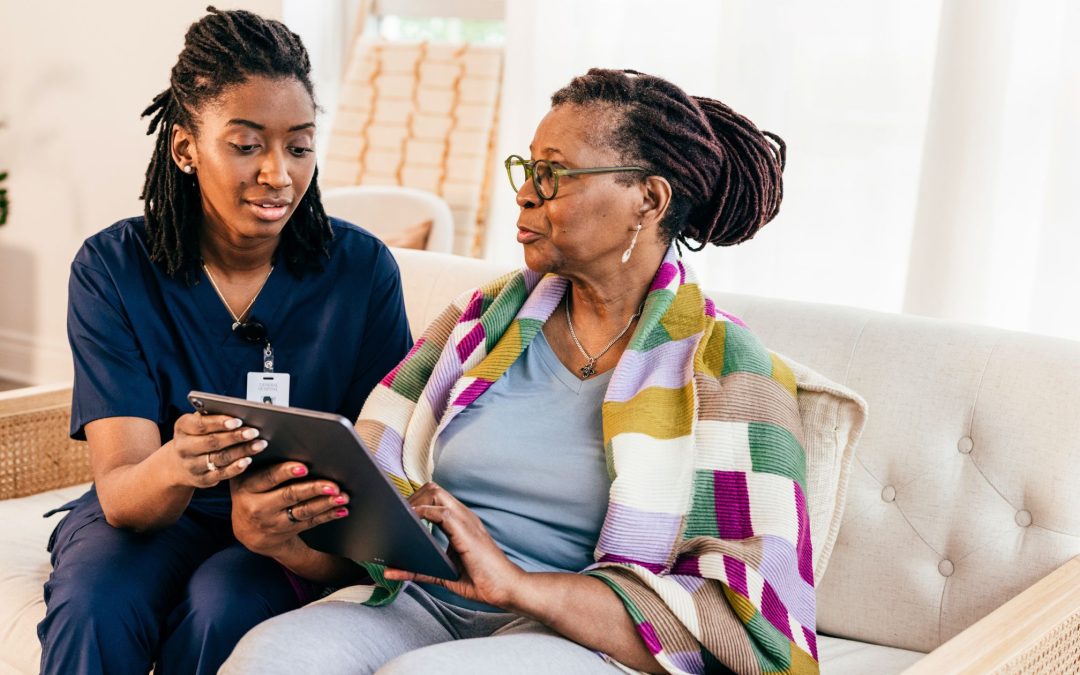Caring for a seniors with Alzheimer’s is a profound responsibility. As their memory fades, so does their ability to manage critical aspects of their health, like taking medications, keeping doctor appointments, or staying current with important vaccinations.
If you’re a family caregiver, organizing these tasks can feel overwhelming, but with the right approach, you can confidently manage it all. This guide provides trusted strategies and facts to help you support your loved one’s health, while also protecting your peace of mind.
The Scope of Alzheimer’s Care in America
Alzheimer’s disease affects millions of American families and the need for structured care is growing rapidly.
- In 2024, approximately 6.9 million Americans aged 65+ are living with Alzheimer’s dementia. This number is expected to nearly double by 2060 (source).{National Library of Medicine}
- Over 11 million unpaid family caregivers in the U.S. provide care for someone with dementia, contributing an estimated 18.4 billion hours of care annually (source). {US Centers For Disease Control & Prevention}
With such an intense level of care required, it’s critical to simplify and stay organized with health-related responsibilities.
Why Vaccinations Are Especially Important When Caring For Seniors With Alzheimer’s
Seniors with Alzheimer’s are at higher risk for infections, complications, and hospitalizations. Vaccinations are a key line of defense.
Recent studies highlight:
- Seniors who received the shingles vaccine had a 20% lower risk of developing dementia within seven years (source) {The Associated Press}
- Recommended vaccines include:
- Influenza (annual)
- COVID-19
- Pneumococcal
- Shingles (Shingrix, recommended for ages 50+)
Staying up to date with these immunizations can help your loved one avoid serious illness and protect their cognitive and physical health.
Managing Medications: Tips for Family Caregivers
Memory loss and confusion often lead to missed or doubled doses, putting seniors at risk. As a caregiver, here’s how you can manage medications more effectively:
- Use a pill organizer with clearly marked days and doses.
- Set daily alarms or smartphone reminders.
- Create a medication chart listing the name, dose, time, and purpose of each medication.
- Schedule medication reviews with a pharmacist or doctor every few months to eliminate unnecessary drugs and minimize side effects.
These simple tools reduce stress and ensure consistent treatment.
Keeping Medical Appointments on Track
Routine medical checkups are essential to monitor Alzheimer’s progression, manage symptoms, and address any new health concerns. However, appointments can be disorienting for those with cognitive impairment.
To make this easier:
- Bundle appointments on the same day to minimize trips.
- Prepare notes about recent changes or concerns before the visit.
- Request morning appointments when your loved one may be more alert.
- Maintain a physical or digital calendar with upcoming medical dates and reminders.
If transportation is a challenge, consider tele-health visits when appropriate or ask local services for caregiver support.
Caregiver Health: Don’t Forget Yourself
Providing care can be physically and emotionally taxing. According to research, caregivers are at higher risk for stress-related health problems, including:
- Depression and anxiety
- Sleep disorders
- Chronic fatigue
Here’s how you can protect your own well-being:
- Join a caregiver support group in-person or online.
- Practice daily self-care: even 15 minutes of quiet, walking, or journaling can help.
- Don’t hesitate to ask for help from siblings, friends, or professional caregivers.
Remember, your ability to care depends on your own health too.
Tech and Tools That Can Help
You don’t have to do it all alone. There are tools available that support both Alzheimer’s patients and their caregivers:
- Caregiver apps: Track medications, appointments, and behaviors.
- Remote monitoring devices: Provide peace of mind through alerts or video feeds, like the Safety Cameras we provide for our senior care clients as part of our exclusive services at Your Home Team Care.
- Automated pill dispensers: Prevent accidental overdosing or forgetting.
Incorporating these tools into your routine can reduce guesswork and make caregiving more sustainable.
Things to remember:
Caring for a loved one with Alzheimer’s isn’t easy, but being proactive about their health makes a world of difference. To recap:
- Prioritize essential vaccines like flu, COVID-19, shingles, and pneumonia.
- Stay organized with medications using charts, reminders, and reviews.
- Coordinate medical care early and maintain a clear appointment calendar.
- Support your own mental health to avoid burnout.
- Leverage caregiving technology for efficiency and safety.
Being a family caregiver is one of the most compassionate acts a person can offer. While the journey through Alzheimer’s is deeply personal, it’s also one that can be navigated with confidence, structure, and support. By managing the key pillars of health vaccines, appointments, and medications, you’re helping your loved one live with dignity and safety at home.

